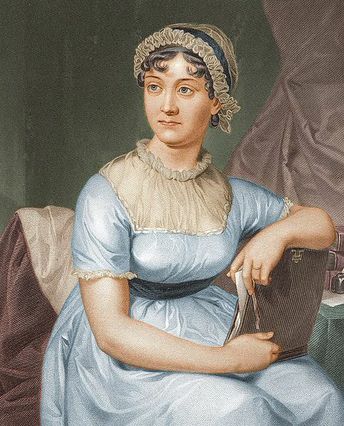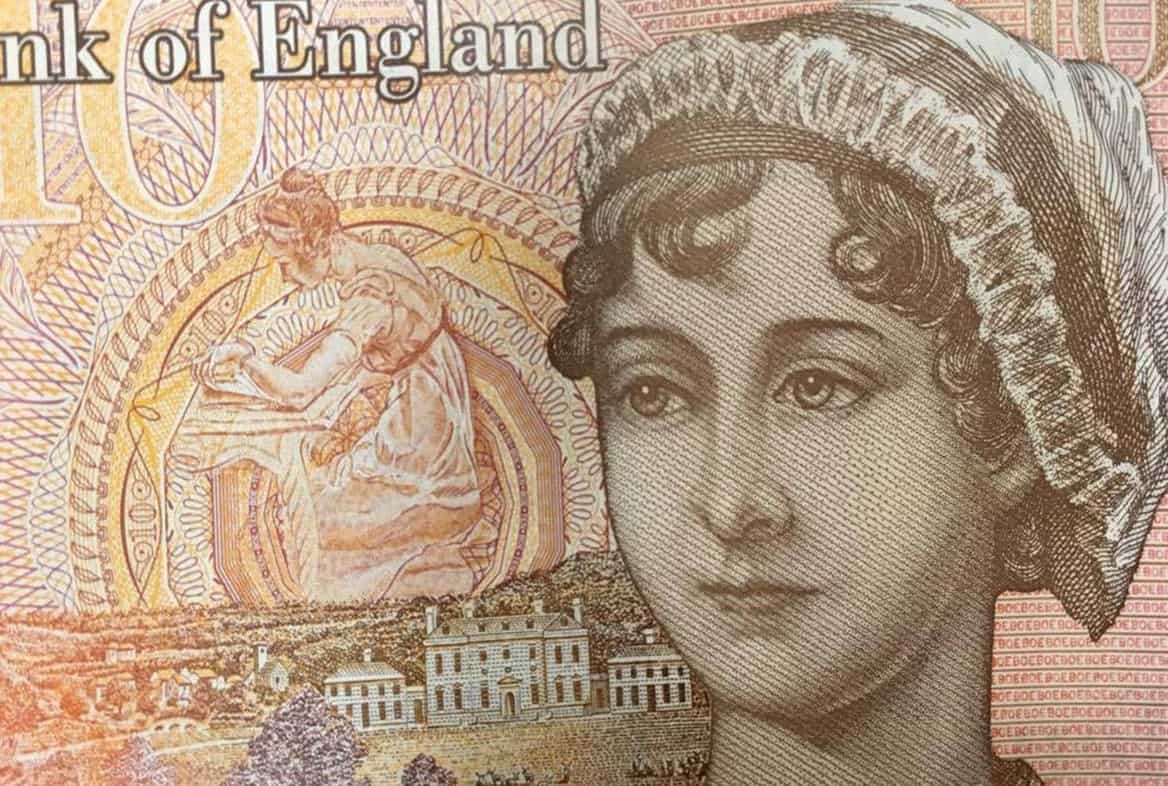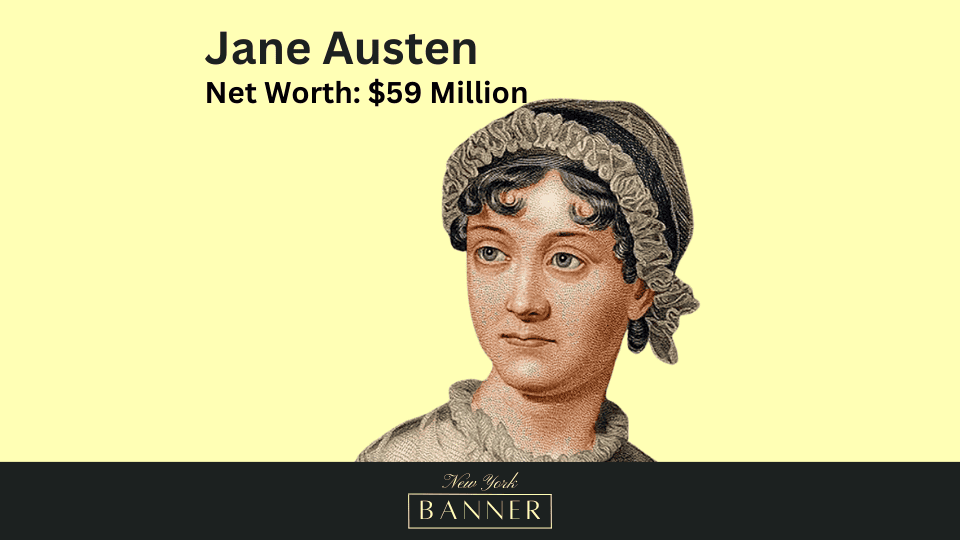Jane Austen, an English novelist born on December 16, 1775, to a family of modest means, became an iconic literary figure with her works critically appraising the British landed gentry of the late 18th century. Her novels, such as “Pride and Prejudice,” “Sense and Sensibility,” and “Emma,” have remained in print for over two centuries, reflecting not just their popularity but also their lasting cultural impact. While her stories often delve into the social dynamics of wealth and marriage, Austen’s own financial standing during her lifetime presents a contrasting narrative to the fortunes of some of her characters.
During her lifetime, Austen’s earnings as an author were relatively modest. Her net worth at the time of her death on July 18, 1817, has been estimated to be around £500, a sum gleaned from her book sales and her family support. However, it’s important to note that the “net worth” concept in the Georgian era differed significantly from today’s understanding, with societal structures and economic measures posing challenges to direct comparisons. Furthermore, the posthumous surge in her books’ popularity and their adaptations have led to Jane Austen’s name and legacy being valued far beyond the mere pounds she earned in her lifetime.
Content of This Article
- Jane Austen’s Appearance
- Facts About Jane Austen
- Jane Austen’s Net Worth
- Early Life
- Jane Austen’s Career
- Jane Austen’s Awards and Achievements
- Jane Austen’s Controversies
Jane Austen’s Appearance (Height, Hair, Eyes & More)
| Height |
5 ft 2 in
1.57 m |
| Weight |
123.45 pounds
56 kg |
| Hair Color | Brown |
| Eye Color | Hazel |
| Body Type | Average |
| Sexual Orientation | Straight |
Facts About Jane Austen
| Nationality | British |
| Estimate Net Worth | $59 million |
| Religion | Christian |
| Zodiac Sign | Sagittarius |
| Birthplace | Steventon, United Kingdom |
| Birthday | December 16, 1775 |
Jane Austen’s Net Worth

As of 2023, Jane Austen’s net worth is approximately $59 million. As a significant figure in English literature, her timeless novels have continued to capture the hearts of readers around the globe. Austen’s skill in crafting stories and characters has solidified her place in the literary canon and translated into lasting economic value.
Her collection of works, namely “Pride and Prejudice,” “Sense and Sensibility,” and “Emma,” offers an insightful commentary on the societal norms and the economic structures of the British landed gentry. Austen’s portrayal of the dynamics of wealth, inheritance, and social standing during the Regency era provides a nuanced understanding of the economics of her time.
While the characters navigated issues of economic security, land ownership, and the quest for a favorable social position, Austen herself has posthumously achieved a form of enduring wealth. In modern terms, the sheer magnitude of her literary success can be analogized to the economic stature attributed to gentry members with substantial landholdings in her novels.
The value of the British pound and its significance within the context of Austen’s lifetime played a pivotal role in denoting social class and stability. In her case, the appreciation of her work has continued to generate substantial monetary worth when adjusted for inflation and contemporary economic terms. The Bank of England’s role in defining the currency’s value during her time resonates in estimating her current net worth when translated into current dollar values.
Austen’s legacy imparts cultural wealth and illustrates the potential for enduring fiscal prosperity through the arts.
Early Life
Jane Austen was born on December 16, 1775, in Steventon, United Kingdom, into an engaging family with an extensive educational background and close sibling relationships. Her formative years were marked by informal learning, supplemented by periods of formal education, which grounded her literary prowess and a family dynamic that profoundly influenced her writing.
The Austens were a tight-knit and moderately privileged family. Jane, the seventh of eight children, was born to George and Cassandra Austen on December 16, 1775, in Steventon, Hampshire, England. Her father, who had overcome early adversity, served as a rector, and her mother belonged to a higher social rank.
Jane’s close bond with her sister Cassandra lasted a lifetime, and she maintained strong connections with her brothers, notably Henry, who later acted as her literary agent and biographer. Austen’s family, particularly her siblings, greatly influenced her life and work. Her brothers’ careers in the Church of England, the Navy and the family’s active intellectual environment provided rich material for her later writings.
Education
Austen’s early education commenced alongside her sister Cassandra at Oxford, but it was cut short due to illness. The sisters’ academic pursuits continued at the Abbey School in Reading, but financial constraints prompted their return to Steventon. Thereafter, education for the Austen sisters was primarily home-based, capitalizing on their fathers’ and brothers’ knowledge. Jane’s participation in family plays and her writings from a young age, including works like Love and Friendship, signified the development of her satirical voice and storytelling abilities that would later characterize her novels.
Jane Austen’s Career

Jane Austen’s literary journey was marked by her insightful depiction of 19th-century English society through her novels. She adeptly used her experiences to craft stories exploring themes of love, marriage, and social standing.
Early Publications and Successes
Jane Austen’s foray into writing saw her first novels crafted with realism and biting irony that pulled readers into the world of the English gentry and clergy. Her first published work, Sense and Sensibility (1811), was initially penned under the title “Elinor and Marianne” and was followed by the widely acclaimed Pride and Prejudice (1813), which had been rejected at first when proposed by her father. Mansfield Park (1814) and Emma (1815) were published to the delight of Austen’s readers, further establishing her as a prominent figure in literature.
Later Works and Posthumous Fame
Although Northanger Abbey and Persuasion were released posthumously in 1817, they were among Austen’s earlier writings. Northanger Abbey humorously critiqued Gothic novels, while Persuasion was penned at the height of her career. Sanditon’s satire on health resorts remained incomplete due to her illness. Moreover, her novels gained a resurgence in popularity when publisher Richard Bentley reissued them in 1833, with her identity disclosed, ensuring her lasting fame.
Reception and Literary Critique
Critics of the day and thereafter have lauded Austen for her literary prowess and insightful social commentary. Her acute observation of character was admired, prompting prominent figures like Sir Walter Scott and Richard Sheridan to appreciate her work’s moral and entertainment quality. Austen became known for her sharp critique of the societal norms of her time through the perspectives of her heroines, earning her a place as a pioneering figure in the world of English literature. Austen’s work has remained relevant and celebrated, influencing countless authors and continuing to captivate readers worldwide.
Jane Austen’s Awards and Achievements

During Jane Austen’s life, societal norms restricted the recognition of women’s literary achievements, and thus, famously, her novels were published anonymously. There is no record of awards attributed to Austen in her own name while she was alive. Despite this historical oversight, her work has been celebrated posthumously.
A significant acknowledgment of Austen’s continuing legacy came when, in 1997, the film adaptation of her novel Emma garnered an accolade. The USC Scripter Award, an honor given to film adaptations of written work, was shared with screenwriter Douglas McGrath.
For her posthumous honors, in 1996, the film Sense and Sensibility won the USC Scripter Award, with the screenplay by Emma Thompson shared in Austen’s honor. Richard Bentley republished Austen’s novels in 1833, allowing her to gain wider recognition and increase posthumous fortune through these editions.
For her legacy recognition, Austen’s legacy gained a tangible form of recognition beyond literary circles when she was selected as the face of the new ten-pound note by the Bank of England in 2013, celebrated on the bicentennial of her death in 2017. She is entombed at Winchester Cathedral, where many visit to pay homage to her life and works.
Lastly, for her financial legacy, Austen’s works continue to contribute to her net worth posthumously. As of 2023, estimates suggest her net worth would have been around $2 million. Despite being afflicted by illness in her later years, her legacy remains robust, with her novels like Lady Susan continuing to resonate—a testament to her literary genius.
While Jane Austen’s accolades were not contemporaneous with her life, her rightful place within the canon of English literature has been cemented, and her works are valued and celebrated well beyond her time in Winchester.
Jane Austen’s Controversies
The social backdrop of Jane Austen’s novels often stirs debate. “Pride and Prejudice,” a beloved classic, depicts a society that has garnered criticism for its limited focus on the affluent classes, namely the landed gentry, and its scarce attention to the lower socioeconomic strata prevalent during the Regency England era. Critics argue that the narrative largely overlooks the struggles of the poor, shining light predominantly on the lives of the wealthy.
Within the echelons of society depicted by Austen, the nuances of wealth and class distinction add a layer of complexity. Take Mr. Darcy, a character of immense wealth, surpassing even that of the Bennet family; he is not part of the landed gentry. His attitude at the Meryton Ball exemplifies the pride and self-importance bred by such a hierarchy, as he dismisses Miss Elizabeth Bennet with a cold detachment, “She is tolerable; but not handsome enough to tempt me.”
Mr. Bingley’s inherited wealth and recent lease of the Netherfield Park estate begs the question of the traditional association of status with land ownership. This aspect echoes the period’s evolving economic landscape, where new money from trade began to challenge old wealth.
The representation of clergy through Mr. Collins introduces another point of contention. His embodiment of ‘Christian forgiveness’ is met with skepticism, even mockery, within the story. His hasty proposal to Miss Charlotte Lucas, immediately following his rejection by Elizabeth Bennet, paints a stark picture of the era’s marital expectations. It underscores the criticism that in Austen’s time, women were raised to aspire primarily to marriage—a reflection some consider an unjust societal standard.
Religious elements in the novel are minimal, which has drawn attention, considering Austen’s father was a clergyman. However, the subtle inclusion of religious references aligns with Austen’s more implicit approach to social commentary. The intricate tapestry of wealth, class, societal values, and personal worth weaves through Austen’s narrative, presenting an enduring tableau for discussion and controversy.
Net Worth of Other Notable Authors
Gabriel Garcia Marquez’s Net Worth
Gabriel García Márquez, often revered as Gabo, was a luminary in the realms of literature, with his novels and short stories carving a permanent mark on the landscape of Latin American narrative arts. Born in Colombia, his unique style of magic realism infused his works with a rich tapestry of myth and reality, profoundly influencing the genre and earning him the Nobel Prize for Literature in 1982. His novels, including “One Hundred Years of Solitude,” “Love in the Time of Cholera,” and “The Autumn of the Patriarch,” not only gained critical acclaim but also enjoyed immense commercial success, contributing significantly to his financial status. At the time of his death, Gabriel Garcia Marquez’s net worth was estimated to be around $10 million, reflecting his monumental success as an author, journalist, and screenwriter.
Emily Bronte’s Net Worth
Emily Brontë, an iconic English novelist and poet of the 19th century, lived quite detached from the concepts of wealth and celebrity as recognized today. Born on July 30, 1818, Brontë’s work was marked by a poignant intensity that only posthumously earned her recognition as a pillar of English literature. Her financial status during her lifetime was modest, and she was not known to have generated substantial wealth from her writing. Brontë’s primary source of income came from her family’s parsonage and her work as a governess and teacher. Therefore, the discussions about Emily Bronte’s net worth in today’s terms can be quite speculative, primarily focusing on the cultural and literary value of her contributions rather than any financial earnings she might have accrued.

